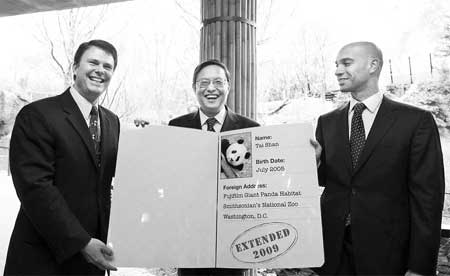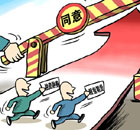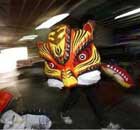Foreign and Military Affairs
Forging stronger ties across the globe
By Tan Yingzi (China Daily)
Updated: 2010-02-12 07:38
 |
Large Medium Small |
Like a roller coaster, China-US relations go through ups and downs.
With a front seat on the ride, Zhou Wenzhong, the eighth Chinese ambassador to the US, has cruised through a few loop-de-loops and hairpin turns.
|
 On April 24, 2007, Ambassador Zhou Wenzhong presented Giant Panda Tai Shan's passport to Adrian Fenty, mayor of Washington DC, and John Berry, director for the National Zoological Park. The passport permitted Tai Shan to extend his stay in DC for two years. Tai Shan, a symbol of China-US friendship, was sent to China earlier this month. [Photo/Lu Mingxiang] |
"As Chinese ambassador to the United States, I always feel a heavy duty on my shoulders and I can never lower my guard for a minute," he told China Daily in the newly-built chancery building of the Chinese embassy.
Wearing a dark gray suit with a white shirt and a red polka-dot tie, the veteran diplomat was in good spirits. Zhou, who will be 65 in August, has been deeply attached to the United States, since he has spent almost half of his four-decade diplomatic career in the country.
His first posting was in the Chinese mission in Washington in 1978, a year before the US and China established official diplomatic ties.
He moved from attaché to third secretary, became deputy consul general in San Francisco and then consul general in Los Angeles before taking the helm as ambassador.
| ||||
Because of his busy schedule, the diplomat has given up almost all of his hobbies, including singing, stamp collecting and swimming.
"I love swimming, but I have only swum three or four times here in the past five years," Zhou said.
His stints as ambassador to Barbados and to Antigua and Barbuda, in the 1990s, offered more time for relaxation and recreation, he added.
He said he eats less ice cream and meat to compensate for the lack of exercise.
Zhou works 9 am to midnight on weekdays, dealing with files and attending meetings and dinners. He said he almost always also does diplomatic work on the weekends.
He has made official visits to every state except North Dakota and Idaho.
"But time is often limited and I usually see only airports, hotels and conference halls. I wish I could have more time exploring the country," he said.
Unforgettable moments
Part of Zhou's job is keeping official communication between the two countries smooth, particularly in unexpected situations.
When Zhou arrived in Washington as the new ambassador in 2005, the two countries were planning President Hu Jintao's State visit to the US.
"We thought since President Hu was to attend the 60th anniversary of the United Nations in September, it would be a good time for the trip," he said.
But in August, Hurricane Katrina hit the US. Then Deputy National Security Advisor J. D. Crouch II called and told Zhou that the planned visit might be postponed and the US was about to announce the decision.
"Though I fully understood their situation, I insisted that any major decision on the visit should be jointly made and suggested that then President George W. Bush phone President Hu to discuss the change," Zhou said. The two leaders spoke by telephone and agreed to change the date.
"There were many things like this in the past five years," the ambassador said.
The Virginia Tech campus shooting that killed 33 people in 2007 was another example. As events unfolded, police said the suspect might be a Chinese student and the State Department informed the embassy about that initial conclusion.
"It was a serious incident and there was no time to ask for instructions from Beijing," Zhou recalled.
The ambassador told the US side that police in the US must not spread rumors until they had irrefutable evidence and that even if the police had evidence proving the suspect was Chinese, they must inform the public in a proper way to ensure the safety of other Chinese students. (The perpetrator turned out to be a South Korean man with a permanent resident visa.)
At the same time, the embassy also sent a special investigation team to the campus immediately, contacting local Chinese student groups to try to alleviate their anxiety. Zhou said he will always remember the Beijing Olympics torch relay in San Francisco.
"I was so touched by the local Chinese for their strong support for the Beijing Olympics," he said, despite some protesting along the relay route. "To ensure the success of the torch relay, Mr. Gavin Newsom, the San Francisco Mayor, and Mr. Peter Ueberroth, the then Chairman of the US Olympic Committee, consulted with me and decided to change the route," he said.
"Facing the disruption, we made the right decision and changed the route to ensure a smooth torch relay," he added.
Zhou has seen China-US ties go through moments of tension in some areas, as well as improve in other areas.
He is currently dealing with the thorny issue of the US' $6.4 billion arms sale to Taiwan and has expressed indignation to the White House, the US National Security Council and senior US State Department officials. "The US and Taiwan can only maintain unofficial relations, as agreed by China and the US at the time of normalization of China-US relations," Zhou said while visiting the governor of Missouri earlier this month.
"Obviously, the sale of weapons to Taiwan is not consistent with that commitment," he added.
He emphasized that Taiwan is the most sensitive core issue in Sino-US relations.
But there are others: US President Barack Obama's decision to meet the Dalai Lama and congressional criticism of China's human rights records bitterly irritated bilateral ties. Zhou told The Washington Post that China prefers that Obama not meet the Dalai Lama.
"We hope the US side will keep its promise with actions and won't provide support and convenience to anti-China separatist forces," he said.
But these disagreements will not thwart the positive direction of the two countries' ties, he added.
"This relationship is not about just a single person but about mutual benefits and expanding common interests," he said.
This trend is evident in the continued high-level dialogues on security and economics between the two countries, Bush attending the 2008 Olympic Games opening ceremony, Obama visiting China less than a year after his inauguration and the completion of a new chancery building of the Chinese embassy in Washington.
The ambassador said he is happy more Americans now see China's rise as an opportunity instead of a threat.
"Recently, some people in the West claimed that, with increase of its national strength, China is becoming cocky and tough, which is far from true." Zhou said. "Bearing in mind the bitter experiences of the old days before the founding of New China in 1949, the Chinese people have always stood against the strong bullying the weak," the ambassador said.
"China always stands for treating each other on an equal footing and convincing people by reasoning," he said.
"At the same time, China has been firm in safeguarding its sovereignty and territorial integrity regarding Taiwan and Tibet-related issues, which bear on China's core national interests."
As to the numerous problems the two countries have to face off, the ambassador said: "We must respect the principles and think about our common interests."
"It is through cooperation rather than conflict that successes will be assured," he said. Qin Jize contributed to the article
Obama's decision to meet the Dalai Lama and congressional criticism of China's human rights records have tested bilateral ties.
Zhou told The Washington Post that China prefers that Obama not to meet the Dalai Lama.
"We hope the US side will keep its promise with actions and won't provide support and convenience to anti-China separatist forces," he said.
But these disagreements will not thwart the positive direction of the two countries ties, he added.
"This relationship is not about just a single person but about mutual benefits and expanding common interests," he said.
This trend is evident in the continued high-level dialogues on security and economics between the two countries, Bush attending the 2008 Olympic Games opening ceremony, Obama visiting China less than a year after his inauguration and the completion of a new Chinese embassy in Washington.
The ambassador said he is happy more Americans now see China's rise as an opportunity instead of a threat.
"It is through cooperation rather than conflict that successes will be assured," he said.
Qin Jize in Beijing contributed to the story







